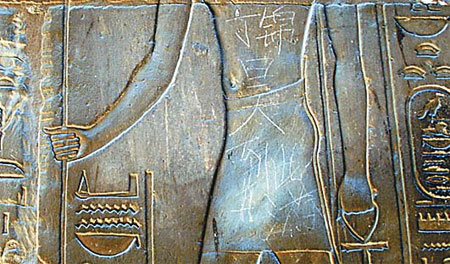Parents of teen vandal apologize after online rage
Updated: 2013-05-27 07:08
By Jin Haixing (China Daily)
|
|||||||||
|
Graffiti on the defaced Egyptian artifact says "Ding Jinhao was here". Provided to China Daily |
The parents of a teen vandal from Jiangsu province have apologized to the public for the graffiti their son scratched on a stone sculpture in an ancient temple in Egypt, which triggered an online uproar as Internet users dubbed it a "loss of face" for all Chinese people.
A micro blogger found the Chinese characters carved on a cameo at the Luxor Temple, one of Egypt's most renowned archaeological sites, in early May. The characters say "Ding Jinhao was here".
The micro blog, posted on Friday night, triggered heated discussion online as the act of vandalism was condemned as being disrespectful to cultural relics.
Ding Jinhao's parents, who live in Nanjing, the capital of Jiangsu province, apologized for his behavior on Saturday and asked for forgiveness from the public after angry Internet users discovered and revealed the identity of the young man, aged 14, a middle school student in Nanjing.
"We want to apologize to the Egyptian people and to people who have paid attention to this case across China," Ding's mother said in Modern Express, a local newspaper.
Ding has realized the seriousness of his misconduct, according to his mother.
His father said they felt regretful after news about the case was spread online.
Shen, the micro blogger who posted the picture of vandalized relics, visited the Egyptian temple on May 6. "I felt embarrassed. It was my most unhappy moment in Egypt."
He said he hopes the case will remind Chinese tourists to behave while abroad and teach them the importance of protecting cultural relics.
The bad manners of some Chinese tourists, which include spitting and littering, have featured prominently in the media in recent years.
In March 2009, a retired man from Changzhou, Jiangsu province, carved his name on a rock in Taiwan's Yehliu Geopark, which triggered intense criticism.
In February, a tourist carved his name on a large cauldron in Beijing's Palace Museum. Failing to find the culprit, one of the museum's staff posted a picture of the vandalized cauldron online.
Chen Xu, a researcher from the China Tourism Academy, said the Tourism Law, which will take effect in October, will force some Chinese tourists to behave properly at tourist sites, but in the long run the key is to raise awareness of the importance of cultural relics and proper manners.
"Travel agencies and guides should also be responsible for preventing tourists from vandalizing cultural relics," he said.
Ye Qianrong, a professor of Chinese studies at Tokai University in Japan, said Chinese tourists' practice of writing their names at tourist sites could date back to the "cultural revolution" (1966-76), when many young students wrote their names in many places.
Ye, who hails from China, said the lack of education for good manners in schools and families is also to blame.
jinhaixing@chinadaily.com.cn
(China Daily USA 05/27/2013 page7)

 Michelle lays roses at site along Berlin Wall
Michelle lays roses at site along Berlin Wall
 Historic space lecture in Tiangong-1 commences
Historic space lecture in Tiangong-1 commences
 'Sopranos' Star James Gandolfini dead at 51
'Sopranos' Star James Gandolfini dead at 51
 UN: Number of refugees hits 18-year high
UN: Number of refugees hits 18-year high
 Slide: Jet exercises from aircraft carrier
Slide: Jet exercises from aircraft carrier
 Talks establish fishery hotline
Talks establish fishery hotline
 Foreign buyers eye Chinese drones
Foreign buyers eye Chinese drones
 UN chief hails China's peacekeepers
UN chief hails China's peacekeepers
Most Viewed
Editor's Picks

|

|

|

|

|

|
Today's Top News
Shenzhou X astronaut gives lecture today
US told to reassess duties on Chinese paper
Chinese seek greater share of satellite market
Russia rejects Obama's nuke cut proposal
US immigration bill sees Senate breakthrough
Brazilian cities revoke fare hikes
Moody's warns on China's local govt debt
Air quality in major cities drops in May
US Weekly

|

|









